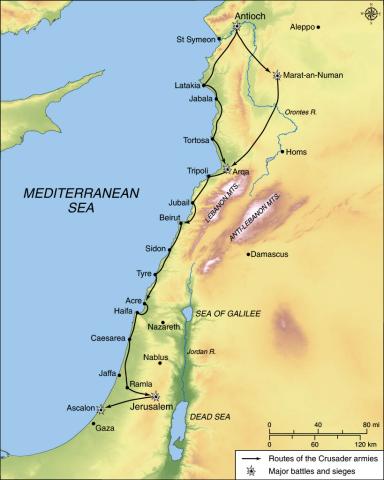The Battle of Ascalon
[10.39.4] Quod audiēns Tancredus statim mīsit nūntium Hierusalem dūcī Godefridō et patriarchae, omnibusque prīncipibus dīcēns: “Sciātis quod nōbīs parātum est bellum Scalōnae: venīte ergō festīnanter cum omnī virtūte quam habēre poteritis!” Tunc iussit dux summonērī omnēs, ut fidēliter īrent praeparātī Scalōnam, obviam inimīcīs nostrīs. Ipse vērō cum patriarchā et Rotbertō Flandrensī comite exīvit dē urbe in fēriā tertiā, et Marturanensis epīscopus cum eīs. Comes vērō Sānctī Egidīī ac Rotbertus Nortmannus dīxērunt sē nōn exiturōs, nisi certum bellum scīrent. Iussērunt ergō mīlitibus suīs, ut pergerent vidēre sī bellum vērē esset et reverterentur quantōcius—quī ipsī mox essent parātī īre. Iērunt illī, vīdēruntque bellum, et citō renūntiāvērunt sē vīdisse oculīs suīs. Continuō dux, apprehēnsō Marturanensī epīscopō, mandāvit Hierusalem, quō mīlitēs quī ibi erant praeparent sē et veniant ad bellum.
notes
(August 1099) Tancred summons the crusaders in Jerusalem to come to Ascalon for the battle. Some of them go at once, but Raymond of Toulouse needs more convincing.
dux: Godfrey.
ut fidēliter īrent praeparātī Scalōnam = ut, fidēliter praeparātī, īrent Ascalonam or ut, praeparātī, īrent fidēliter Ascalonam.
in fēriā tertiā: on Tuesday, August 9, 1099.
Marturanensis epīscopus: Arnulf, bishop of Martirano, in southern Italy.
Iussērunt ergō mīlitibus suīs: “they ordered (some of) their warriors.”
quī ipsī mox essent parātī īre: “(and that) they (the count of Saint-Gilles and Robert of Normandy) would soon be ready to go.” The grammar is difficult, and I have added a dash to indicate the break in sense.
mandāvit Hierusalem, quō mīlitēs ... praeparent sē et veniant: Godfrey told him to go to Jerusalem and tell the soldiers to get ready and come.
vocabulary
renuntiō (1): to report, announce

